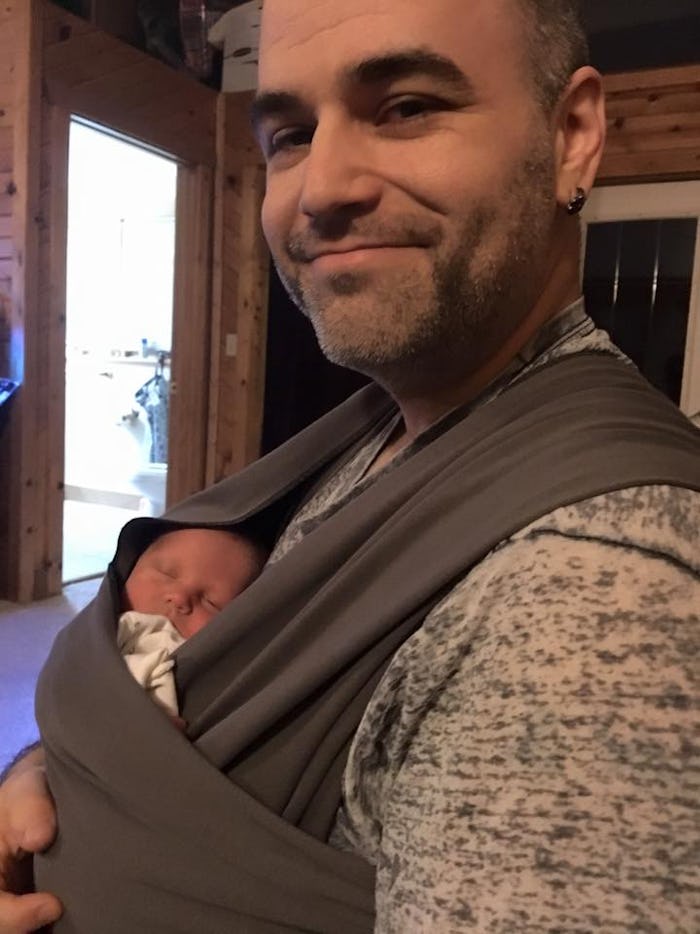Life

What Your Son Shouldn't Hear You Say To Your Hubby
When most people think about gender and parenting, they think about things parents need to do, say, and model for our daughters to ensure they grow into confident, empowered adults. In my experience, focusing on girls isn't enough. If we also want our sons to feel safe and be able to explore who they are and who they want to be, we need to start paying attention to the things we say in front of them, too. To start, there are some things you should never say to your husband in front of your son.
I am a little ashamed to admit that I sometimes slip up. It's not easy, and there's a ton of cultural constructs even the most self-aware feminists have to set aside, to avoid doing damage or modeling really crappy behaviors and standards for our sons. In my focus on raising badass feminist daughters, I sometimes forget that our culture hurts boys, too, and there are times when I unconsciously shame our sons.
Like when I joke with my husband about doing things around the house that are typically deemed "women's work" or when I say things like "man-up," when I really mean "be responsible." I am trying really hard to remove all references to gender from my vocabulary, but holy crap is it hard when we hear these things every day. Our kids hear them, too, and internalize sometimes harmful ideas about the "right" way to be a boy or even that they have a free pass to hurt others because they are male. If they don't match society's expectations about being a boy, or are gay, bisexual, asexual, transgender, or genderqueer, they'll face even more challenges figuring out how to fit in and operate in the patriarchy.
It's scary to think that we might reinforce the things we hate about our society. So, I am trying to actively change the way I talk in front of my kids.
"Man Up" Or "Be A Man"
People say this all of the time. What does "be a man" even mean? As if there's only one way to do it right. Seriously. I have come to understand that "man up" really means "take responsibility," "have courage," or "get sh*t done." What do those things have to do with being a man? Why don't we just say, "do it," rather than assign a gender to feeling empowered or being an adult?
Comments About His Body
As an eating disorder survivor, I am hyper-aware of how comments I make about my body can be internalized by my daughters. I don't always think about how these types of comments (both positive and negative) about my husband's body might impact our sons, though. Boys in our culture are taught that they should be tall, muscular, and masculine. Internalizing these ideas can seriously hurt our sons, especially if they don't look or feel the "right" way.
"You Take This One, 'Cause You're A Guy"
If we want our kids to learn that gender doesn't matter when it comes to who does what in a family, we've got to stop assigning tasks based on gender. That means that dad shouldn't be the only person to address stereotypical male questions and concerns, like how to handle a bully or how to fix a bike tire.
"You Don't Have To Do That, 'Cause You're A Guy"
The same goes for letting dads off the hook for tasks like cooking dinner, changing diapers, brushing hair, and making birthday cupcakes, or even when your daughter wants advice about a person she likes or her period. How will men learn to do these things if we don't let them have a chance to do them? Guys, I know it might be scary. Repeat after me: you are a parent, you can do this thing.
Making A Big Deal Out Of It When He Does "Women's Work"
It's one thing to say "thank you," when your partner helps out with things around the house, but if we want to normalize the idea that men and boys can and should do things that women have traditionally done in households (like child care, diapers, and dishes), we've got to stop treating men like they are rock stars when they do them.
"Don't Cry"
It's OK for men to cry. Boys deserve to grow up knowing that it's OK to feel the full spectrum of human emotion and that expressing how you feel is not a weakness, it's a strength.
"Can You Babysit The Kids?"
Fathers don't babysit, they parent. We've got to delete this phrase from our day-to-day conversation.
"You're Such A Mama's Boy"
Even if this is true, why do we use this as an insult? I want my sons to love and respect me, and I want my husband to have a great relationship with his mother.
"Don't Be Such A Girl"
I don't often say things like this, but I admit, it happens. My mantra: being a girl is awesome, not an insult.
"Don't Be Afraid"
It's OK for men to have and show fear, especially dads. As a parent, I am freaking terrified every day. Scared of the world we live in and that my kids are going to get hurt or that I am going to completely screw them up. My husband deserves empathy when he expresses fear, not to be told to hide his feelings.